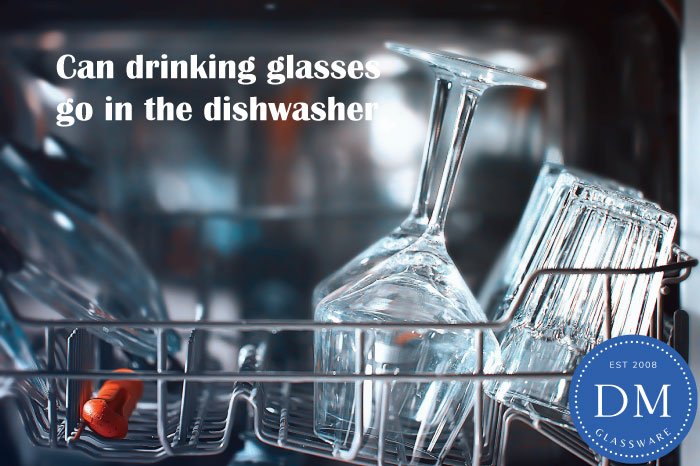
Can Drinking Glasses Go in the Dishwasher?
Can drinking glasses go in the dishwasher? It seems like a simple question, but the answer often lies in the fine print—or rather, the small symbol stamped on the bottom of your glassware.
While tossing them into the dishwasher feels like a time-saving solution, the wrong move can lead to etched surfaces, fragile rims cracking, or even dull, cloudy finishes over time.
Understanding what “dishwasher safe” truly means can save your favorite glassware from an untimely demise. Let’s decode those symbols, demystify dishwasher compatibility, and ensure your glasses stay as clear and pristine as the day you bought them.
Table of Contents
Types of Glassware and Their Dishwasher Compatibility
Not all glassware is created equal when it comes to the rigors of the dishwasher. Each type has unique qualities that determine whether it can safely handle the heat, detergent, and water pressure.
From robust tempered glass to delicate crystal, knowing your glassware’s composition is essential for making the right choice and avoiding damage.
Types of Dishwasher Safe Glassware
- Tempered Glass
- Heat-Resistant Glass
- Everyday Drinking Glasses
- Sturdy Mason Jars
- Reusable Glass Cups
- Thick Glass Tumblers
- Glass Bakeware
- Microwave and Dishwasher Safe Labeled Items
Tempered Glass vs. Regular Glass: Key Differences
Tempered glass is engineered for durability. It undergoes a special heating and cooling process that strengthens it, making it more resistant to breakage and sudden temperature changes.
This makes it an ideal candidate for the dishwasher. Regular glass, on the other hand, lacks this durability, making it more prone to cracks or chips, especially under intense heat or high-pressure water jets.
Crystal Glasses Care: What Makes Them Special?
Crystal glasses, with their unmatched brilliance and elegance, are often the pride of your dining collection—but they come with extra care requirements.
Crystal is softer and more porous than regular glass, making it more vulnerable to etching and cloudiness when exposed to dishwasher detergents and cycles. Handwashing with mild soap is often recommended to preserve their sparkle.
Heat-Resistant Glass and Its Benefits
Heat-resistant glass, such as borosilicate glass, is designed to withstand extreme temperature fluctuations without cracking.
This makes it a fantastic option for both dishwashers and microwaves. These glasses are often used for baking dishes or drinking glasses meant for hot beverages, combining practicality with durability.
However, even heat-resistant glass can lose its clarity if subjected to harsh detergents, so opt for gentle cleaning agents whenever possible.
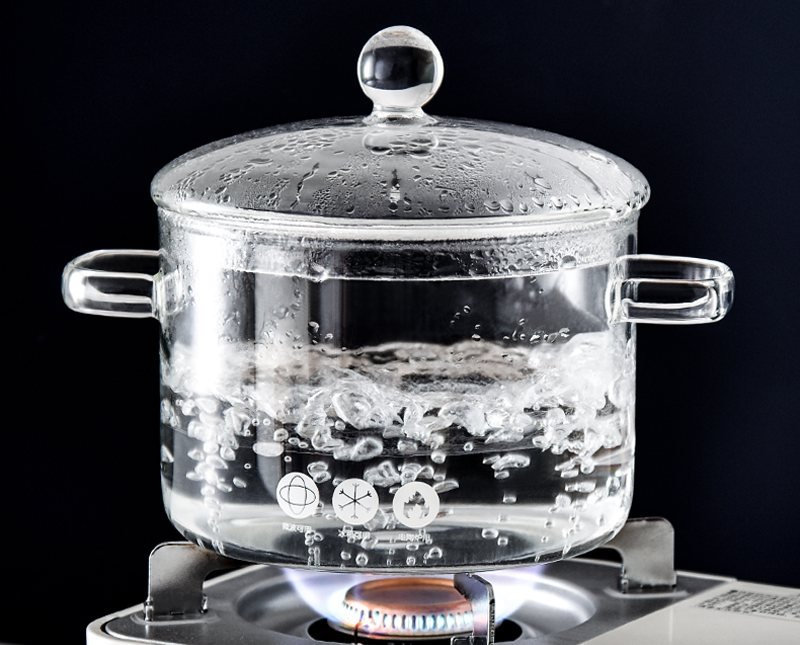
Heat-Resistant Glasses
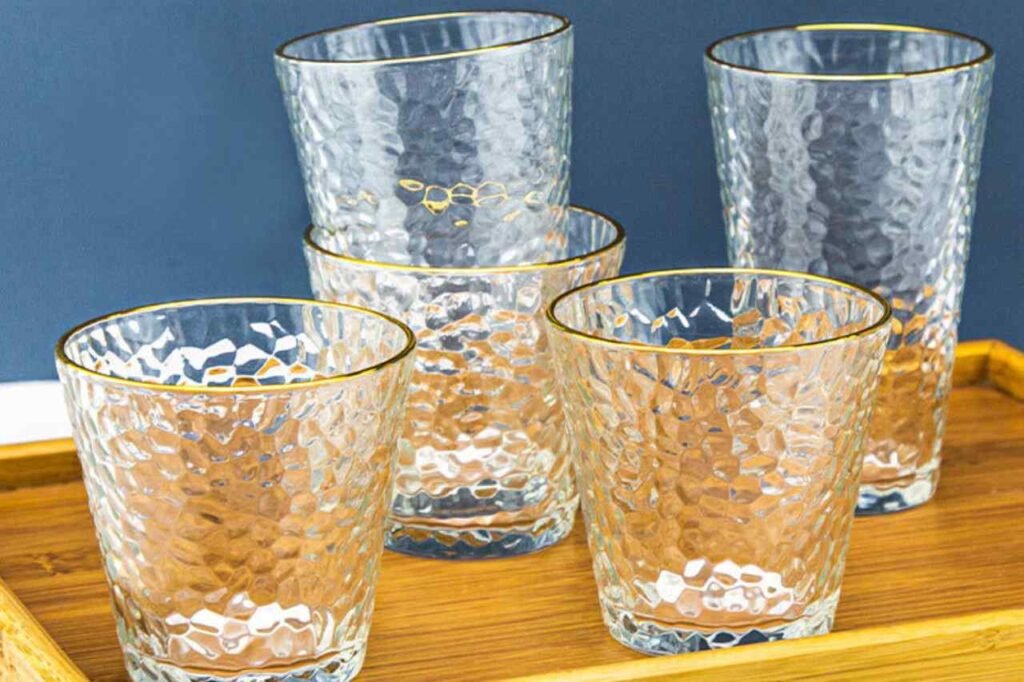
Glass Tumblers
Risks of Putting Glassware in the Dishwasher
The convenience of a dishwasher can sometimes come at a cost, especially for glassware. Improper care during the wash cycle can lead to lasting damage, from etching and scratches to dull, cloudy finishes. Understanding these risks and how to mitigate them is key to maintaining the beauty and longevity of your glasses.
Common Causes of Glass Etching and How to Prevent It
Glass etching is a subtle but permanent form of damage that manifests as a frosted or cloudy appearance on the surface of the glass. It’s typically caused by high heat, harsh detergents, or prolonged exposure to water with high alkalinity.
To prevent etching, always use a dishwasher detergent labeled as gentle or glass-friendly, avoid overly hot cycles, and remove glasses promptly after the wash to minimize exposure to residual moisture.
Avoiding Scratches on Fragile Glass Items
Fragile glassware, such as thin tumblers or stemmed wine glasses, is particularly prone to scratching in the dishwasher. Scratches often occur when glasses rub against each other or other utensils during the cycle.
To prevent this, space out fragile glass items on the top rack, use a dedicated dishwasher basket for smaller pieces, and choose a cycle with lower water pressure.
Preserving Glass Clarity: Tips for Spotless Results
Cloudy glasses are a common issue for dishwasher users, often caused by hard water deposits or leftover detergent residue. While not as severe as etching, cloudiness can make glassware look old and unappealing.
To keep glasses crystal-clear, use a rinse aid in every cycle, clean your dishwasher filter regularly to remove buildup, and occasionally run a cleaning cycle with vinegar or a dishwasher cleaner to tackle hard water issues. Additionally, drying glasses with a soft cloth immediately after washing can ensure a streak-free, spotless finish.
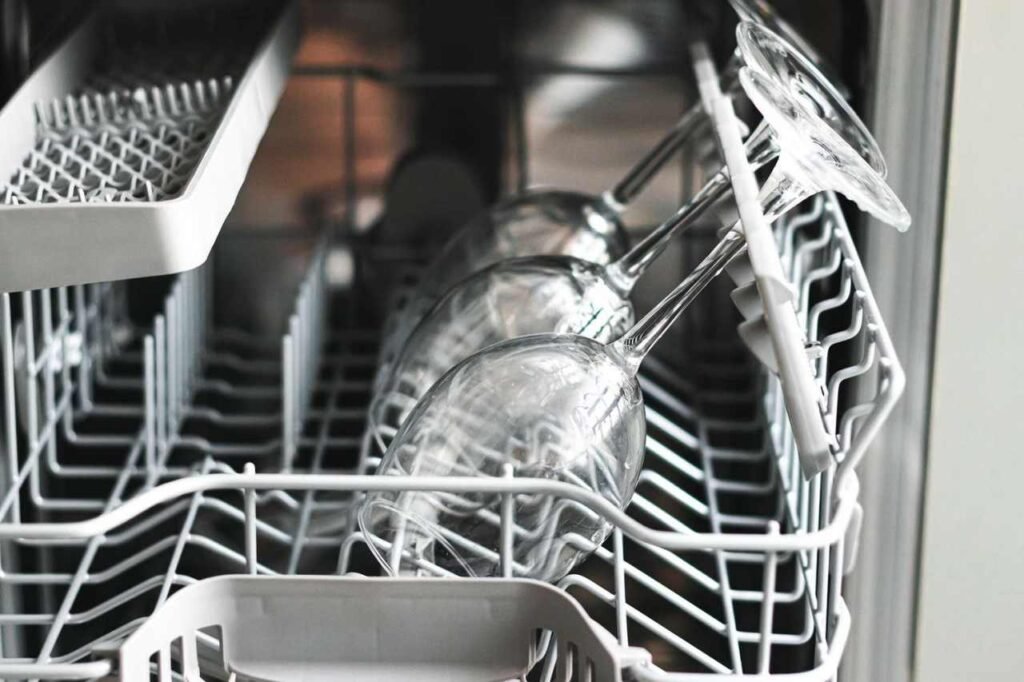
Proper Loading Techniques for Glassware
Loading glassware into the dishwasher might seem straightforward, but incorrect placement can lead to cracks, chips, or even shattered pieces. A little extra care during loading can go a long way in protecting your glassware and ensuring a thorough, safe clean every time.
The Right Way to Load Dishwasher Racks for Safety
Placement is everything when it comes to dishwasher safety. Glasses should always go on the top rack, where the water pressure is gentler, reducing the risk of breakage.
Make sure each glass has enough space around it to avoid contact with other items. Position glasses upside down but slightly angled to allow water to drain completely without pooling in the base or lip.
Safety Guidelines for Dishwashing Fragile Glassware
Fragile glass items, like wine glasses or stemmed glassware, require special care. Use dishwasher-safe racks or stem holders designed to secure these delicate pieces during the cycle.
Always choose a gentle or “glassware” setting if your dishwasher offers one, as these cycles use lower temperatures and softer sprays to clean without causing damage.
Preventing Glass Breakage: Best Practices
Glass breakage often happens when items collide during the wash or from sudden temperature changes. To minimize risks, avoid overloading the dishwasher, as crowded racks can lead to items shifting and bumping against each other.
Additionally, pre-rinse glasses with cold or lukewarm water to prevent thermal shock from sudden exposure to hot water during the cycle. Lastly, inspect your dishwasher’s racks and prongs regularly to ensure they are free of rough edges or damage that could scratch or weaken your glassware.
Choosing the Right Dishwasher Cycle for Glassware
The dishwasher cycle you select can significantly impact the safety and cleanliness of your glassware. High heat or intense water pressure might seem thorough, but these settings can damage delicate glasses. Selecting the proper cycle ensures both cleanliness and preservation.
Understanding Dishwasher Heat Settings
Dishwasher heat settings control water temperature during the wash and drying phases. While high temperatures are effective at breaking down grease and sanitizing, they can also weaken fragile glass or contribute to etching over time.
For glassware, lower heat settings are generally safer. Look for cycles labeled “Eco,” “Gentle,” or “Delicate,” as these minimize heat exposure while still cleaning effectively. If your glasses have a “dishwasher safe” label, verify the maximum temperature they can withstand to avoid accidental damage.
Which Dishwasher Cycle Works Best for Glass?
The ideal dishwasher cycle for glassware depends on the type of glasses you’re cleaning. For everyday drinking glasses, a “Normal” or “Eco” cycle usually works well. These cycles provide sufficient cleaning power without subjecting the glasses to extreme conditions.
For more delicate or fragile items like wine glasses or crystal, choose a “Gentle” or “Glassware” cycle. These options use softer water sprays and moderate temperatures, protecting fragile rims and stems. Avoid the “Heavy” or “Sanitize” cycles for glassware, as their aggressive settings can cause damage.
Detergents and Cleaning Tips for Spotless Glassware
The right cleaning products and techniques can make all the difference in maintaining the clarity and sparkle of your glassware. From choosing the best dishwasher detergent to tackling cloudy buildup, a few simple adjustments can ensure your glasses always come out looking their best.
Selecting the Best Dishwasher Detergent for Glasses
Not all dishwasher detergents are created equal, especially when it comes to glassware. Harsh detergents with high alkaline levels can strip the surface of the glass, leading to etching or dullness over time.
Opt for a gentle, glass-friendly detergent with lower abrasiveness. Look for products specifically labeled as “dishwasher safe for glassware” to minimize the risk of damage while ensuring effective cleaning. Pods, gels, and powders all work well, but make sure to avoid formulas that leave behind residues.
Cloudy Glasses Fix: Restoring the Shine
Cloudiness on glasses is often caused by hard water mineral deposits or detergent buildup. To restore their clarity, soak cloudy glasses in a mixture of white vinegar and warm water for 5–10 minutes, then gently scrub with a soft cloth or sponge.
If the cloudiness persists, it might be due to permanent etching. To avoid this in the future, use a rinse aid during every dishwasher cycle, as it helps prevent mineral deposits from clinging to the glass.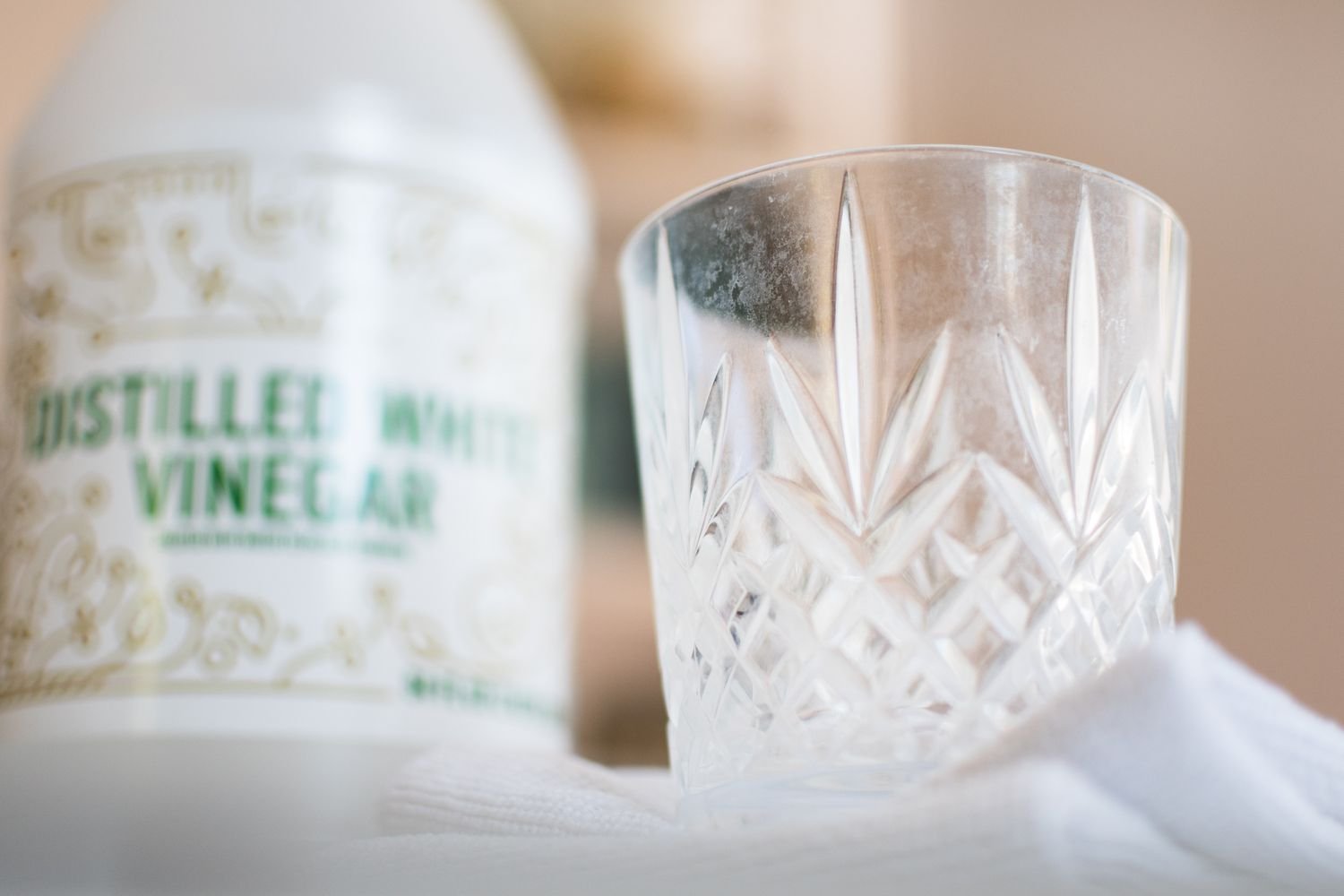
Drying Spot-Free Glassware with Ease
Drying spots can ruin the look of otherwise clean glassware. To achieve a flawless, spot-free finish, use a high-quality rinse aid to help water slide off during the final rinse cycle.
If your dishwasher has a “Heated Dry” setting, make sure it’s turned on to accelerate evaporation. For extra care, remove glasses immediately after the cycle finishes and dry them with a soft, lint-free cloth to eliminate any lingering moisture or streaks.
When to Skip the Dishwasher
While dishwashers offer convenience, some situations call for the extra attention and care of handwashing. Certain glassware types and conditions make it safer to skip the machine altogether to preserve your items’ beauty and durability.
The Case for Handwashing Drinking Glasses
Handwashing is the gentlest cleaning method for drinking glasses, especially those with intricate designs, hand-painted details, or thin, delicate walls. The direct control it offers prevents chips, scratches, or clouding that can occur in a dishwasher.
When cleaning by hand, use warm water, a mild dish soap, and a non-abrasive sponge or cloth. This approach is particularly beneficial for everyday glasses that don’t require high temperatures or intense cycles to get clean.
Why Some Glasses Need Extra Care
Certain types of glassware, such as crystal glasses, antique items, or those with metallic accents, should never go in the dishwasher. These materials are prone to damage from heat, detergents, or the force of water sprays.
In addition, glasses with glued embellishments or logos can lose their design under harsh conditions. Handwashing these items ensures their aesthetic details stay intact while reducing the risk of damage. When in doubt, always check for a “dishwasher safe” label or err on the side of caution by washing delicate pieces by hand.
Eco-Friendly Dishwasher Tips
Running a dishwasher doesn’t have to come at the cost of environmental responsibility. With thoughtful choices, you can keep your glassware spotless while reducing energy and water usage. Here’s how to clean efficiently without compromising sustainability.
Energy-Efficient Dishwasher Cycles for Glass
Modern dishwashers often include eco-friendly cycle options that are designed to use less water and energy. For glassware, cycles labeled “Eco” or “Energy Saver” are ideal. These settings clean effectively at lower temperatures and with reduced water pressure, which is gentler on fragile glass while cutting down on energy use.
Pair these cycles with glass-friendly detergents to ensure cleanliness without contributing to unnecessary resource consumption. Additionally, running your dishwasher only when it’s fully loaded maximizes efficiency while minimizing waste.
How to Wash Glassware While Conserving Water
If you choose to handwash delicate or special glassware, you can still adopt water-saving techniques. Use a basin filled with warm, soapy water instead of letting the tap run continuously. This reduces water waste while providing a controlled environment for cleaning fragile items.
When using the dishwasher, skip the pre-rinse step—modern machines are built to handle light food residue, saving gallons of water per load. Finally, consider air-drying glassware rather than using the heated dry function, further lowering your energy usage.
Special Cases: Unique Glass Items in the Dishwasher
Not all glass items fit neatly into the standard rules for dishwasher cleaning. From delicate wine glasses to heavy-duty mason jars, knowing how to handle these special cases ensures both cleanliness and longevity for your unique glassware.
Cleaning Wine Glasses Without Damage
Wine glasses, with their thin stems and delicate rims, require special attention in the dishwasher. Use a dedicated stemware holder or a dishwasher rack specifically designed to secure wine glasses. This prevents them from tipping over or colliding with other items during the cycle.
Choose a “Gentle” or “Glassware” cycle, which uses lower temperatures and softer sprays, and opt for a mild detergent. For extra care, skip the heated dry cycle and towel-dry these fragile glasses immediately after washing to prevent water spots and ensure their sparkle.
Can You Wash Mason Jars and Reusable Glass Cups?
Mason jars and reusable glass cups are sturdier than wine glasses, but they still require thoughtful placement in the dishwasher. Always remove the lids and place the jars upside down on the top rack to prevent water pooling.
Ensure the jars are made of heat-resistant glass, as older or decorative jars may crack under high temperatures. Reusable glass cups, such as those with silicone sleeves, should have their sleeves removed before washing to ensure all surfaces are properly cleaned and dried.
Are Microwave and Dishwasher Safe Items Truly Safe?
Items labeled as microwave and dishwasher safe are designed to withstand both high temperatures and dishwasher cycles, but it’s important to understand their limitations. Repeated exposure to high heat and harsh detergents can degrade even durable glass over time.
To preserve these items, avoid using abrasive sponges or harsh cleaning agents. If you notice signs of wear, such as fading labels or hairline cracks, it’s best to handwash them or use a gentler dishwasher cycle to extend their lifespan.
Conclusion: Ensuring the Longevity of Your Glassware
Glassware plays a central role in our daily lives, from the practicality of drinking glasses to the elegance of fine stemware. Balancing the convenience of a dishwasher with the care your glassware deserves ensures these items remain beautiful and functional for years to come.
Balancing Convenience with Proper Care
Using a dishwasher can save time and effort, but not all glassware is built to endure its intensity. Understanding the specific needs of different types of glass—whether tempered, crystal, or heat-resistant—allows you to make informed choices about when to use the dishwasher and when handwashing is a safer option.
By following proper loading techniques, selecting appropriate cycles, and using the right detergents, you can achieve spotless results without sacrificing the integrity of your glassware.
Final Tips for Keeping Glassware in Perfect Condition
- Always check for “dishwasher safe” labels before washing any glassware.
- Avoid overcrowding the dishwasher to prevent scratches and breakage.
- Use a gentle detergent and a rinse aid to maintain clarity and shine.
- Handwash delicate or heirloom pieces to preserve their beauty.
- Regularly clean your dishwasher to remove buildup that could affect glassware.
With these simple practices, you can enjoy both the convenience of modern cleaning and the enduring charm of sparkling, well-cared-for glassware.
Frequently Asked Questions About Drinking Glasses and Dishwashers
Are drinking glasses dishwasher safe?
Some drinking glasses are dishwasher safe, especially those labeled as such. Everyday glassware and tempered glass are often suitable, but delicate or decorative pieces may not be.
How do I know if my glasses are dishwasher safe?
Check the base of the glass for a “dishwasher safe” symbol or the manufacturer’s care instructions. If there’s no label, it’s safer to handwash.
Are lead crystal glasses dishwasher safe?
No, lead crystal glasses should not go in the dishwasher. The high temperatures and detergents can cause clouding, etching, or damage to the delicate material.
How do you put drinking glasses in the dishwasher?
Place glasses on the top rack, upside down but slightly angled, to prevent water pooling. Ensure they are spaced out to avoid contact and scratches.
What glasses are not dishwasher safe?
- Lead crystal glasses
- Antique or heirloom glassware
- Glasses with metallic or decorative finishes
- Thin, fragile glass items
- Hand-painted or glued embellishments
Should you put glasses in the dishwasher?
You can put dishwasher-safe glasses in the machine, but for delicate or special glassware, handwashing is recommended to avoid damage.
What is not allowed in the dishwasher?
Avoid placing lead crystal, non-dishwasher safe plastics, cast iron, wood, and certain decorative items in the dishwasher. These materials can warp, crack, or degrade.
Why do drinking glasses get cloudy in the dishwasher?
Cloudiness can be caused by hard water mineral deposits or permanent etching from high temperatures and harsh detergents. Using a rinse aid and gentle detergent can help prevent this.
What is the best dishwasher setting for glasses?
Use a “Gentle” or “Glassware” cycle, which employs lower heat and gentler water pressure to protect delicate glass items.
What happens if you put non-dishwasher safe glasses in the dishwasher?
Non-dishwasher safe glasses can crack, chip, or develop permanent clouding and etching due to high heat and abrasive detergents.
How to clean drinking glasses?
Handwash with warm water and mild soap using a non-abrasive sponge. For cloudy glasses, soak them in white vinegar for a few minutes before rinsing thoroughly. For dishwasher-safe glasses, use a gentle detergent and rinse aid to maintain clarity.
DM Glassware is providing custom glasswares for various occasions.
Our main products are machine-made glasswares, glass cups, glass drinkwares and tablewares for home and kitchen use. Such glasses like glass tumblers, glass mugs, whiskey glasses, shot glasses, glass candy jars, glass bowls, beer glasses, etc.
We also recommend the most suitable packaging method based on different sales types, such as different display boxes, adding stickers, tags, etc.
Recent Posts

Are stemless wine glasses good for wine?

Which Wine Glass Is Best for Red Wine?

What Are the Different Types of Wine Glasses?

